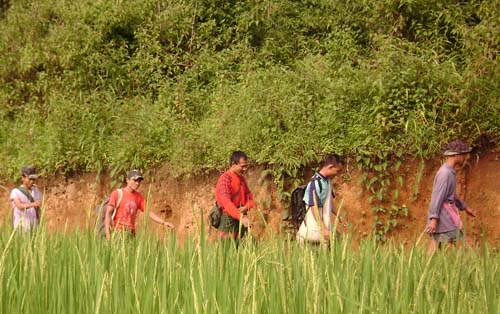The Burma Army in Papun Township has arrested two community health workers from the Back Pack Health Worker Team who were giving medical treatment to villagers in the area.

The Back Pack Health Worker Team is an independent and non-profit organization that has been delivering primary health care for over 13 years to people in conflict zones and rural areas deep inside Burma – where access to healthcare is otherwise unavailable.
Currently the BPHWT have 80 Back Pack teams of three to five medics delivering medical services to 187,000 internally displaced people in eastern Burma.
Major Saw Kler Doh, an office manager with the Karen National Liberation Army Brigade 5, based in the Papun District confirmed to Karen News, that on October 29, the Burma Army Light Infantry Battalion 212 arrested both the male and female health workers who were providing health care to villagers in the Koe Khee area.
“The health workers were arrested while seeing a patient at a betel nut plantation in the area. The Burma Army soldiers arrived to unexpectedly at the plantation and happened like that."
The male worker is named as Saw Phar Say, 25, his female co-worker is, 24,.
At the time of writing the latest update from the KNLA’s Major Saw Kler Doh, is that Naw K'Mwee has been sent to the Burma Army Strategic Operations Command HQ in Papun, the Major was unable to confirm the whereabouts of Saw Phar Say.
Burma Army Infantry Battalion 19 and Light Infantry Battalin 340, 341 and 434 operate in the area, eastern Papun town where the two health workers were arrested.
In 10 years, gunfire or landmines have killed nine Back Pack medics and one traditional birth attendant. The most recent killing was in 2010, when Burma army soldiers shot a medic.
Saw Livingstone a long time member of the Back Pack was recently reported assessing the dangers of delivering health care in Burma.
“If the Burma army is in the area when we are treating patients we have to leave. If we are found we can be arrested, tortured and even killed – not only us, but also the villagers for receiving treatment.”
Livingstone, 35, says villagers known to have received medical treatment are arrested.
“If the soldiers find a empty packet of basic medicine, they arrest the person, but it is also a big problem for the whole village. These villagers are poor. They can’t afford to buy medicine. They can’t work because of the travel restrictions, they can’t sell their farm produce and in some cases they are not allowed to travel to work on their farms. It’s a cruel cycle.”
Livingstone lists the ailments his Back Pack team treat - malaria, tuberculosis, pneumonia, bronchitis, accidents, falls, cuts, worms, dysentery, diarrhea, urinary tract infections, anemia, malnourishment, gunshot wounds and landmines.



